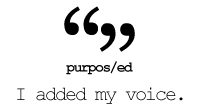 I am not due to write my contribution to the #500words campaign for purpos/ed until Tuesday 8th March. However, I have woken this morning still thoroughly energised by last night’s #ukedchat special – hosted by one of the founders of purpos/ed – Doug Belshaw. As such, I felt that I should share a few thoughts here and now, lest they be forgotten amongst the myriad of ideas and notions swirling around my brain.
I am not due to write my contribution to the #500words campaign for purpos/ed until Tuesday 8th March. However, I have woken this morning still thoroughly energised by last night’s #ukedchat special – hosted by one of the founders of purpos/ed – Doug Belshaw. As such, I felt that I should share a few thoughts here and now, lest they be forgotten amongst the myriad of ideas and notions swirling around my brain.
To paraphrase what I wrote on Doug’s blog last night after the discussion – one of my concerns about the state of education is that not enough people actually stand up and take action. They are happy (or not) to sit in the staffroom grumbling about the current governments stance; or to bemoan the limits of the curriculum; or feel that standards are slipping, yada, yada, yada. But they are not ready and willing to do something about it. And I don’t mean do something about it in the ‘take to the streets’ and ‘march on whitehall’, do something about it. I mean stand up and raise these issues with SLT; speak to the principal, parents, governors about how they believe education should be; ignore the heard and do something different in the classroom; have the conviction to believe in what you say in the staffroom and go and do something about it.
I do not believe that it was at all surprising to any of us involved in the discussion on #ukedchat last night that we are not happy with the state of education; that we feel the current government’s idea of what “good education” is does not fit with our own beliefs; or that most of us felt learning should be more student centred. I mean come on, most of us involved in the debate are edupunks – we break the mould everyday, whether its David Mitchell leading the Primary blogging revolution or Dawn Hallybone evangelising about the merits of games based learning. Of course we care, of course we’re engaged, of course we will stand up but that’s because we have been doing so for some time now.
We need to mobilise the educators who are not like us; who are, perhaps, more afraid than we are. Those educators who share similar beliefs and values but perhaps do not have the skills or the guts to go against the grain. Maybe they are an NQT and don’t want to be seen as an upstart still considered ‘wet behind the ears’; or maybe they are a veteran who doesn’t blog, tweet or Facebook and so feel that their voice will not be heard. How do we give these people the courage and means to be heard? To do something different? To challenge the status quo?
This purpose, this debate, this mission is bigger than those of us who are standing square and tall; spitting in the face of traditional Victorian education. It is about each and every child, parent, educator who faces many more years of a curriculum/education that is not fit for purpose; that is not forward thinking; that will not facilitate the sort of learning that will open doors for people. Instead it is closing them, firmly shut. How do we motivate young people to see education as something to be valued and something that is theirs not ours? How can we help them to claim it for themselves? How do we get parents to understand that education is about much more than grades and a getting a job ‘when the learning is over’? These are huge challenges; huge purposes that need to be addressed if the engagement and passion on display last night is to be turned into more than rhetoric.
What binds us all is the belief that education does have a purpose (although this is different for everyone) but in 2011, more than ever, it faces huge challenges.
686 words! Gah! How I am going to stick to 500 words, I have no idea?!? However, you will be able to read more about what I believe the purpose of education is on Tuesday 8th March, right here on James Michie “…a 21st Century Educator”.
